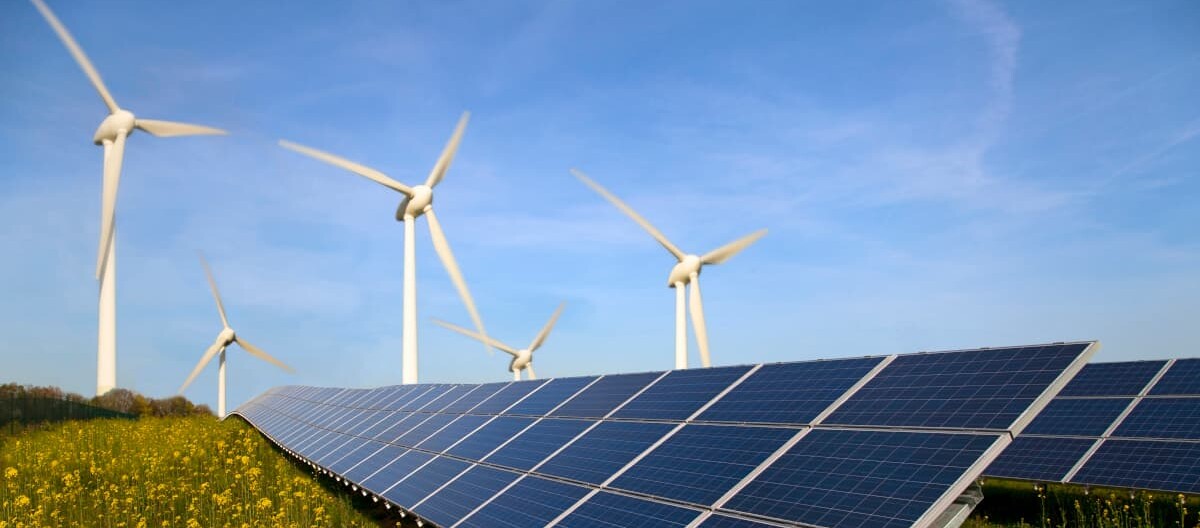Why renewable energy makes sense for companies and households
Today, many companies and households are focused on sustainable action and production, usually with renewable energy at the centre. With the sharp increase in energy prices, companies are looking to find affordable solutions. In addition, promoting sustainability plays an important role in business marketing.
According to Deloitte, ‘When it comes to reducing carbon emissions across the economy, switching to low carbon energy is one of the most important changes a business can make.’ Businesses across the UK need to reconsider their carbon use and support the government in its aim to reduce greenhouse gas emissions and generate electricity from renewable sources.
By switching to renewables and reducing emissions, companies can contribute to efforts to combat climate change. This is made possible with photovoltaic systems, wind turbines, hydroelectric and biomass power plants, heat pumps and more. When implemented properly, investing in this technology will eventually pay for itself. In addition, solar, wind, and tidal energy offer alternative sources of energy in the UK.
How the government will enhance energy security
According to the UK government, Powering Up Britain will ‘enhance our country’s energy security, seize the economic opportunities of the transition, and deliver on our net zero commitments.’ To deliver on these goals and maintain progress, the government has created a new department, the Department for Energy Security and Net Zero. This department seeks to provide the following:
- Energy security by providing energy independence and means of energy within Britain.
- Consumer security by lowering bills and providing cheap wholesale electricity prices.
- Climate security by moving away from fossil fuels that produce waste and are expensive.
- Economic security by opening new jobs, reducing inflation and boosting sector growth.
The plan will push for net zero and deliver plans for nuclear energy, carbon capture, hydrogen production, offshore wind and solar power, fossil fuel reduction, energy efficiency plans in the household, and decarbonisation plans for road and air travel.
More on the current sector
According to the leading global platform for legal reference, analysis, and news, ICLG, the UK is committed to cutting greenhouse gas emissions by 78% by 2035 and achieve a 100% reduction of the same by 2050.
The UK is working with its natural sources - one being high average wind speeds. ‘As a result, onshore and offshore wind farms together are the largest source of renewable energy in the UK, with 14.9% of aggregate UK generation coming from offshore wind projects and 13.9% from onshore wind projects in Q1 2022,’ according to ICLG’s Renewable Energy Laws and Regulations Report 2023 United Kingdom. The country’s second largest energy source is bioenergy.
The UK continues to take massive strides toward their goals, with renewable energy making up over 45% of the country’s electricity generation in Q1 2022. This broke all their previous records, and with the country’s new initiatives, the record is expected to be repeatedly broken.
Shifting your business to renewable sources of energy
According to Deloitte, the process of shifting to renewable energy will be different for every company. For some companies, it’s as simple as contracting a new supplier. And for other companies, it requires Power Purchase Agreements or an in-house system of renewable generation.
If a company is looking to switch, it should take into account:
- The price of renewables and ways to guarantee it with Renewable Energy Guarantees of Origin (REGO)
- Storage options
- Replacements of natural gas with hydrogen
- Emission estimations
- Small steps toward energy efficiency
- Company-wide strategies
The government wants to work closely with companies in its efforts to combat climate change. As part of this it continues to support the development and growth of key industries. According to the Powering Up Britain plan, ‘Our Floating Offshore Wind Investment Scheme will provide up to £160 million to kick start investment in port infrastructure projects, supporting the growth of wind power manufacturing in the UK.’
The government is also offering support to the automotive industry: ‘We want the UK to be one of the best locations in the world to manufacture electric vehicles, with an end-to-end zero emission vehicle supply chain.’
Delivering a strong business environment
The UK government strives to make the UK the best place for businesses in the world. To reach this goal, the government is ‘ensuring that the UK’s tax system is one of the most competitive of the world’s major economies.’ They will support SMEs with increased tax reliefs.
What’s more, the government has implemented a ‘long-term policy framework on energy security and net zero so businesses can plan and invest with confidence.’ The vision as a whole ensures that the UK will have one of the cheapest wholesale electricity prices in Europe by 2035, a 50% increase in electricity generation capacity to gain energy independence by late 2030s, and a focused plan to capitalise on decarbonisation.
Learn more about Powering Up Britain on the UK government’s website.

